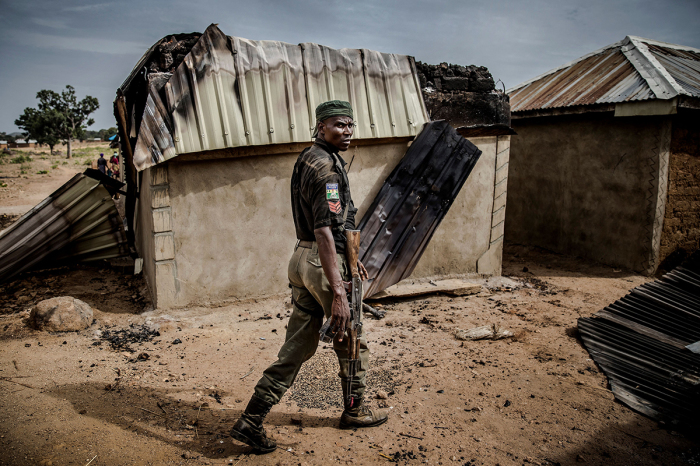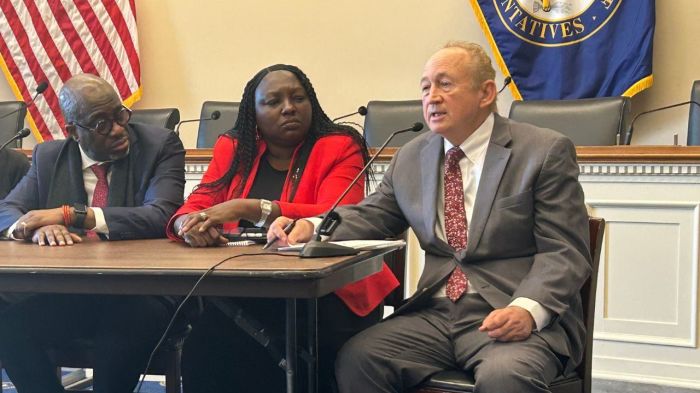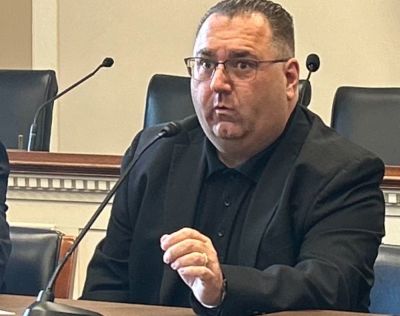
WASHINGTON — A radical Fulani tribe that advocates say is “hell-bent on turning Nigeria into a caliphate” is abducting and holding Christians in chains while the Nigerian government and media turn a blind eye, according to journalists sounding an alarm about religious and ethnic tensions.
Douglas Burton, a former U.S. State Department official and now senior editor of Truth Nigeria, a project of Equipping The Persecuted, shared details of the organization’s reporting during a Wednesday Capitol Hill press conference on the terror camps within a forest behind Rijana village in the northwestern Kaduna state.
Based on interviews with survivors, Truth Nigeria has reported that there are at least 11 major camps in the vast forest south of Kaduna, and each one reportedly holds more than 50 captives.
“So there’s approximately 500 or 600 people in the forest now, and they have maintained these hostage camps there since December of last year,” Burton said. “So thousands of people have gone through this system, and many were killed.”

Survivors of the terror camps who have recounted their experiences in interviews with Truth Nigeria have said that their captors barely fed them and beat them regularly. Hostages in the camp are often killed if their families cannot afford to pay a ransom.
One survivor, a mother named Esther, said Fulani terrorists abducted her and her 10-month-old daughter, Anita, from their home in Gaude village in June 2025. The terrorists marched Esther and several others they had kidnapped into the Rijana enclave, where they held their captives in an assortment of camps.
During her time in captivity, Esther said that the kidnappers warned her against reciting any Christian prayers. But the mother stated that prayer was one of the few consolations as a hostage, where she witnessed the execution of two people whose parents failed to pay a ransom.
Once, when the mother’s baby cried, one of the terrorists snatched the baby from Esther, covering the child’s nose and mouth before Esther managed to wrestle the baby back.
After enduring months as a hostage, Esther was released on Aug. 27, according to Truth Nigeria. The former captive said that despite her kidnappers forbidding it, she prayed that she would one day be released from the terror camp.
At the press conference, several faith and nonprofit leaders also raised concerns about what they say is the Nigerian government’s failure to protect Christians, as well as some Muslims, from violent Fulani terrorists. In addition to mass killings, they say many face the threat of being abducted and held for ransom.
“The kidnappers are Fulani,” Judd Saul, executive director of Equipping The Persecuted, emphasized during the press conference on Wednesday.
“They are part of the Fulani ethnic militia. The people that are doing the killing, the kidnapping, and taking over Christian communities are the Fulani ethnic militia. This is a jihadist Muslim tribe that is hell-bent on turning Nigeria into a caliphate.”
Numbering in the tens of millions, the Fulani people group is one of the largest nomadic ethnic groups with tribes dispersed across the Sahel and West African countries. Predominantly Muslim, Fulani comprise hundreds of clans, and many different lineages do not hold extremist views.
However, advocates have warned that some Fulani adhere to extremist ideology that has resulted in more violence impacting and displacing predominantly Christian farming communities in the Middle Belt of Nigeria in the last several years, leading to thousands of deaths.
While some activists have warned for years that the level of violence has reached the standard for genocide, the Nigerian government has claimed that the violence is not religious in nature and is simply farmer-herder clashes exacerbated by other factors.
While experts debate the role religion plays in the conflict, the U.S. Commission on International Religious Freedom has raised concern that “violence by and against Fulani groups is clearly aggravating religious tensions” in countries like Nigeria.
Multiple speakers accused the Nigerian government of being aware of terror camps in the Rijana Forest. They also allege the government doesn’t respond to intelligence reports warning of attacks against Christian communities.
“The conditions are indeed horrifying,” Burton stressed. “One of the most horrifying things is that the Nigerian government has not acknowledged our reporting, has not responded to our telephone calls, has not been able to help rescue any of these people.”
Burton accused the Nigerian government of paying off Nigerian reporters to keep them quiet, saying it conceals the truth about what is happening.
While the Nigerian national security advisor claimed in February that the government had rescued around 50 hostages somewhere in Rijana, Burton said that these former captives were not made available to Truth Nigeria for interviews. Since the organization could not interview the victims, the senior editor noted that it’s hard to tell if this report is “true or bogus.”

Saul of Equipping The Persecuted, which is dedicated to reporting on Nigerian Christian persecution and enhancing villages’ security, asserted that most people may have heard reports about abductions in Nigeria.
“But what no one asks is: What happens to the people after they’re kidnapped?” Saul said. “Are they released? Are they ransomed out? What’s going on?”
“We know for a fact by eyewitness accounts that there are currently over a thousand Christians held in captivity being held for ransom,” he added. “They are being tortured, they are being starved, they are being beaten, and Christians are being executed on a daily basis if the ransoms aren’t paid.”
He urged the media and international communities to clearly name who the perpetrators are, disputing reports that the situation is the result of climate change.
“This isn’t climate change, this isn’t farmer-herder clashes, or any of these other nebulous groups or situations that are applied to this,” Saul said. “No, this is radical Islamists practicing a real-life jihad in front of our own eyes. And unless something is done now and soon, millions of Christians are going to die.”
Several speakers called on the U.S. State Department to reinstate Nigeria to its Countries of Particular Concern list of worst religious freedom-violating countries after Nigeria was removed from the list in 2021 under the Biden administration, a decision that sparked criticism from USCIRF.
Additional solutions they proposed included holding the sponsors of extremist groups like Fulani terrorists accountable for their actions.
Samantha Kamman is a reporter for The Christian Post. She can be reached at: samantha.kamman@christianpost.com. Follow her on Twitter: @Samantha_Kamman

















